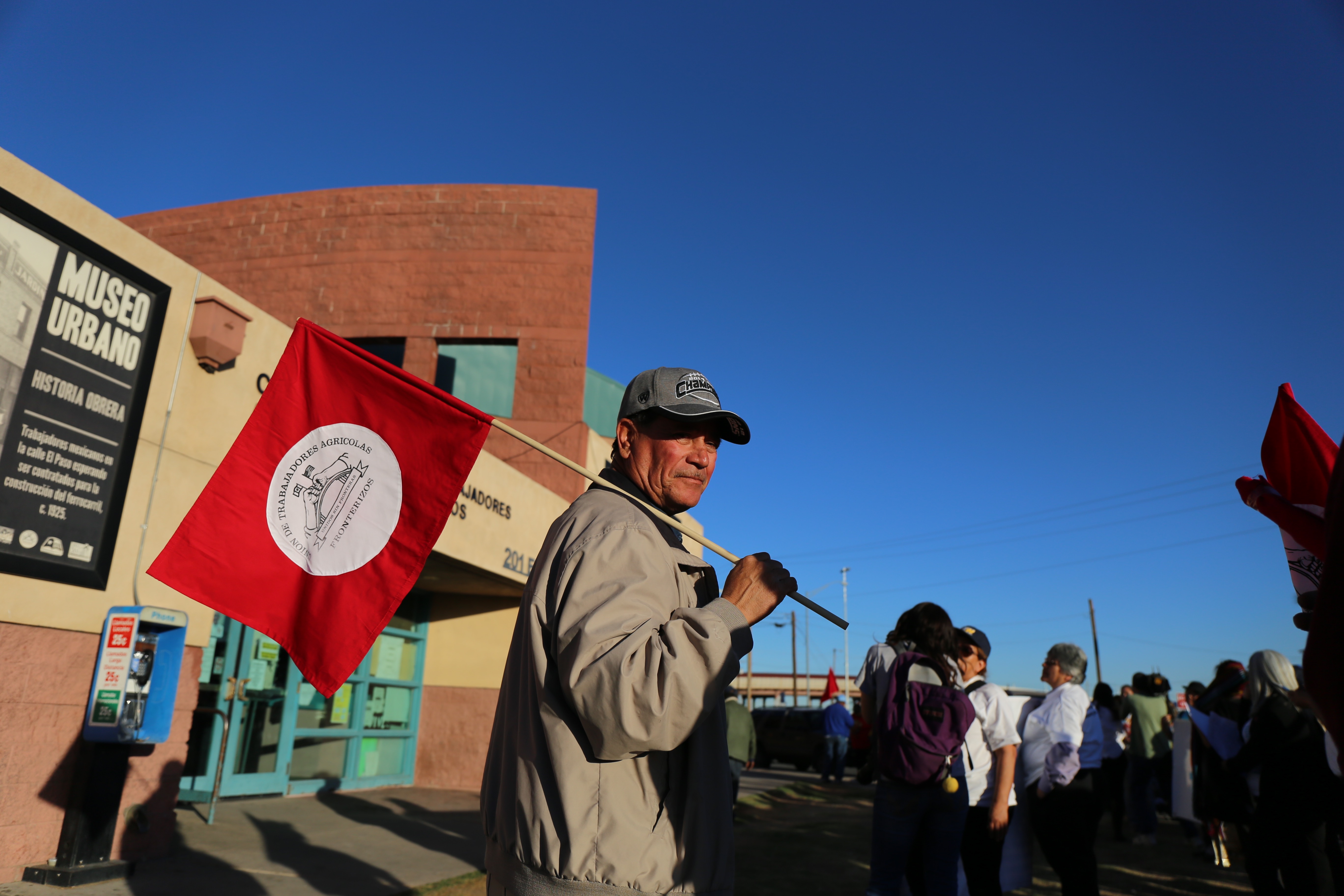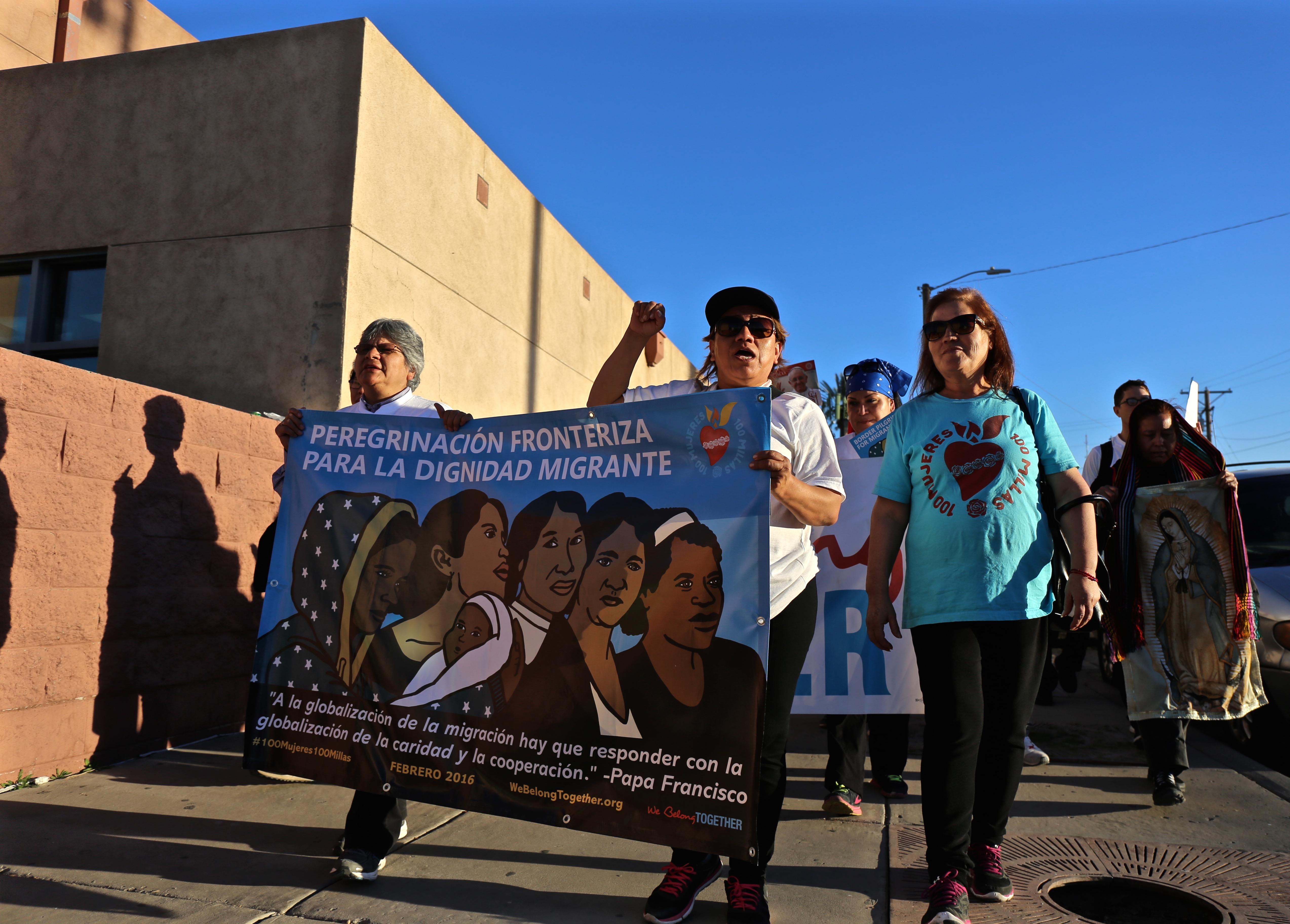Pilgrims Journey from Afar to See the Pontiff
By Jacqueline Sanchez
Reporting Texas

Raymundo Salas carries a flag outside of the Centro de los trabajadores agrícolas fronterizos in El Paso on February 16, 2016. The center sits right next to the US-Mexico border, where farm workers cross every day. Daulton Venglar/Reporting Texas
EL PASO – Alison Miller, a Unitarian Universalist minister, traveled from Morristown, N.J., to hear Pope Francis’s sermon in Juárez. Her church ministers to immigrants and LGBTQ communities, and in Francis, she felt a kindred spirit.
“Being able to be here and connect with one another is a reminder we really are a country of immigrants, and that’s why I’m here,” Miller, 41, said Tuesday in El Paso. “Like the pope said, this is our shared issue.”
Miller was one of the 200,000 people expected to visit El Paso-Juárez this week to witness the pope. Francis’s visit culminated with a Mass at the fairgrounds in Juárez that was simulcast at the University of Texas-El Paso’s Sun Bowl Stadium. By 1 p.m., crowds were making their way into the Sun Bowl for a Mass that didn’t begin until after 4:30 p.m.
A recurring theme of people interviewed about their visits was the strong pull exerted by Francis’ message of inclusion for minority communities and compassion for the poor.
Austin Auxiliary Bishop Daniel Garcia made the trip at the invitation of the Mexican Episcopal Conference, he said in an interview on his flight to El Paso Monday night. Garcia had seen Francis twice before, in Rome and during the papal visit to Washington, D.C., in September.
In Juárez, Garcia planned to help celebrate the Mass. He said he felt a strong connection with the people traveling from around the nation to see the Pope.
Candelaria Araiza, 60, an El Paso housekeeper, had been chosen to be part of La Valla, a human chain that lined the route of the Pope’s visit. Her spot was close to the Chamizal, a park in Juárez.
On her way home from work Tuesday afternoon, Araiza carried with her a 24-pack of 12-ounce lemon-lime Gatorades and a small backpack filled with trail mix snacks to take with her to Juárez. She discussed her excitement in Spanish, which was translated for this article.

Demonstrators march from the border to Sacred Heart Church in the Segundo Barrio neighborhood of El Paso on February 16, 2016. Daulton Venglar/Reporting Texas
“It could be that he stands up out of his popemobile, and I get a chance to meet him,” Araiza said. “Just seeing him for even a couple seconds would be the maximum for me!”
Miller, the New Jersey minister, visited El Paso with members of the 100 Women Charitable Foundation, a group based in California whose initiatives include supporting families. They made a stop at the federal courthouse in El Paso for a brief news conference before marching to the nearby Sacred Heart Church.
Esmeralda Dominguez, 33, a homemaker from Colorado who attended the event with her 11-year-old son, hoped to draw attention to the problem of families separated by U.S. immigration policies. Her husband was deported in 2012.
“I believe that all of us women need to be the image of the woman who is tired of being separated from our families,” she said. “For us… love has no borders.”